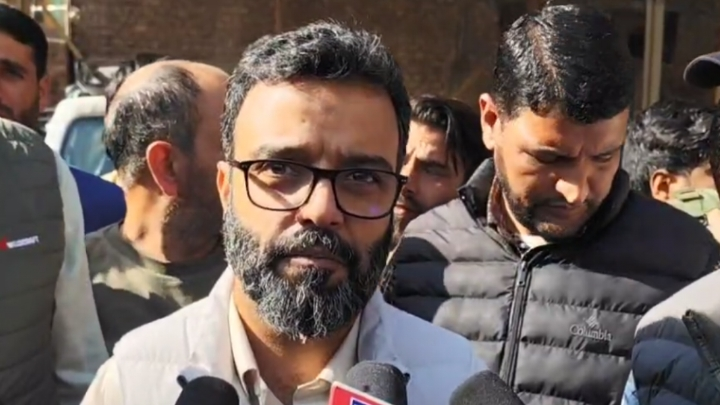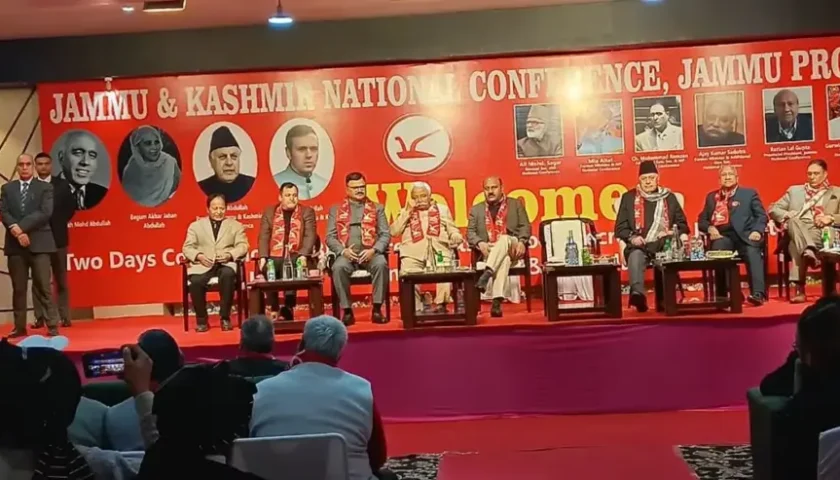Srinagar MP’s Strong Rebuke Signals Rising Dissent Within Party Ranks
By: Javid Amin | 12 October 2025
In a rare public criticism from within the party, Aga Syed Ruhullah Mehdi, senior leader and Member of Parliament from Srinagar, has accused the Jammu & Kashmir National Conference (NC)-led government of failing to deliver on key political promises during its first year in power. His remarks have triggered ripples across Jammu & Kashmir’s political landscape, raising questions about the direction and priorities of the Omar Abdullah administration.
Speaking to reporters in Srinagar on October 11, 2025, Mehdi said bluntly:
“Whatever was needed to be done on the political front has not happened. The intent that was mandatory has not been shown yet.”
The Core of Mehdi’s Criticism
Mehdi’s statement is more than a passing comment — it reflects growing frustration among segments of the party and the public. He outlined three main areas of failure:
-
Lack of Political Initiative:
No concrete steps have been taken toward meaningful political dialogue or advancing the cause of statehood restoration and regional autonomy. -
Disconnect from Public Grievances:
The administration, he suggested, has not established a responsive channel to address citizen concerns, leaving people feeling unheard and sidelined. -
Missed Legislative Opportunities:
Despite holding a comfortable majority in the Assembly, the government has refrained from tabling bold political or legal measures, opting instead for symbolic actions.
“The government should not aim to please me or party leaders. It should listen to the people. If they are raising concerns, those must be addressed,” Mehdi said.
One Year of NC Rule: Promises vs. Reality
The NC returned to power after the 2024 elections with tall promises to rebuild the political architecture of Jammu and Kashmir following the 2019 revocation of Article 370. Its campaign focused on:
-
Pushing for restoration of statehood
-
Safeguarding land and job rights
-
Strengthening civil liberties
-
Rebuilding trust between citizens and the state
However, critics—including Mehdi—argue that the administration has fallen short of these expectations. Instead of initiating structural political reforms or securing legal guarantees, much of the first year has been marked by administrative measures, symbolic outreach, and cautious politics.
Political analyst Noor Mohammad Baba notes,
“The NC government had a rare opportunity to reshape the post-Article 370 political landscape. One year later, the results are underwhelming.”
Political Backdrop: Budgam Bypoll Looms
Mehdi’s remarks come just weeks ahead of the Budgam Assembly by-election, scheduled for November 11, 2025 — widely seen as a referendum on Omar Abdullah’s first year in power.
The seat, vacated by Omar himself, holds symbolic value. Opposition parties — including Aam Aadmi Party and Awami Ittehad Party — are fielding strong candidates. Internal criticism from Mehdi could:
-
Undercut NC’s campaign messaging
-
Encourage opposition narratives on governance gaps
-
Expose factional unease within the party
Sources close to Mehdi indicate that while he remains committed to NC’s core ideology, he wants the party to “return to its political roots” rather than drift into technocratic governance.
What the Government Promised vs. What’s Delivered
| Promise | Status after One Year | Public Sentiment |
|---|---|---|
| Restoration of statehood | No concrete progress — SC hearings underway | Growing impatience |
| Legal safeguards on land and jobs | No major legislation introduced | High concern |
| Political outreach & dialogue | Minimal engagement with civil society | Disappointment |
| Administrative reforms | Some progress on recruitment & transparency | Mixed reviews |
Internal Dissent or Constructive Pressure?
Mehdi’s statement could be interpreted in two ways:
-
Warning Shot: A sign of internal fissures, as senior leaders push the government to take bolder stands on core issues.
-
Strategic Pressure: A calculated nudge to course-correct before the 2026 general elections, where NC will be tested on its delivery record.
Party insiders say Omar Abdullah is aware of the criticism and may accelerate certain legislative initiatives — including land and job protection bills — to reclaim political ground.
“NC cannot afford to appear complacent or disconnected. Mehdi’s voice echoes public sentiment,” said a senior NC functionary on condition of anonymity.
Broader Political Context
The criticism also comes at a sensitive time for the INDIA alliance, which is already navigating tensions over Rajya Sabha seat-sharing after Indian National Congress withdrew from the race citing lack of a “safe seat.”
Coupled with high-stakes Nagrota and Budgam bypolls, the alliance is under pressure to present a cohesive front. Mehdi’s remarks could either spur reform within NC — or widen existing cracks if not managed tactfully.
Public Pulse: Hope Meets Frustration
On the ground, the mood among voters is complex.
-
Youth express disappointment over delays in job policy and lack of political clarity.
-
Civil society groups want the government to legislate protections on land ownership and employment for locals.
-
Business community is urging for stability and policy direction, especially in tourism and infrastructure.
Political commentator Shujaat Bukhari (late) had once described NC as “a party that survives on its political positioning.” Many believe Mehdi is trying to remind the leadership of that DNA.
Final Word: A Defining Political Moment
As the NC government completes its first year, Ruhullah Mehdi’s critique acts as a political mirror — reflecting not only internal unease but also public impatience with the slow pace of political restoration.
Whether Omar Abdullah responds with bold legislative and political steps or continues with a cautious approach may determine the future trajectory of NC in J&K politics.
“The question isn’t whether the government has failed completely — it’s whether it has fulfilled the expectations it created,” said analyst Noor Mohammad Baba.
If NC course-corrects now, it may still shape the narrative heading into 2026. If not, Mehdi’s remarks could mark the beginning of a deeper political churn within the ruling camp.




